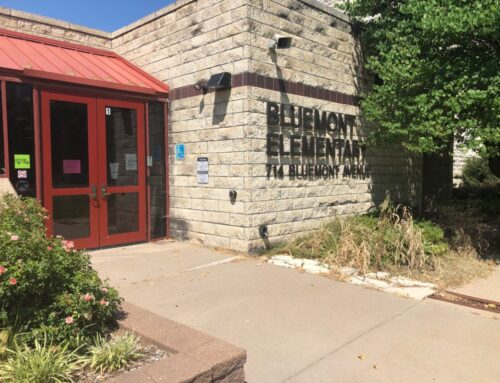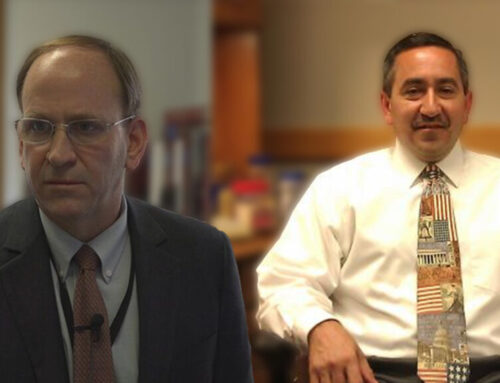

Kansas legislators will make their way back to Topeka this week after a two week recess.
News Radio KMAN caught up with two of the Manhattan area’s newest legislators this week on In Focus, State Sen. Usha Reddi (D-Manhattan), who assumed Sen. Tom Hawk’s seat in January, following his abrupt retirement and State Sen. Kenny Titus (R-Manhattan), who succeeded Ron Highland in the 51st district, after he retired at the end of his term. The pair weighed in on tax bills, childcare licensing requirements and some bipartisan legislation that moved forward this session. The full interview is available at the bottom of this page.
Senate Bill 169
One bill that many are watching is the tax bill, a proposal to set a flat income tax rate of 5.15%, removing the state sales tax on food by Jan. 1, 2024, and changing the property tax exemption from $80,000 to $60,000. It also includes a 1% tax cut for businesses. Rep. Titus voted for the bill, saying it wasn’t as conservative as the initial House plan, but something he could still support.
“It still leaves us with responsible ending balances. I think we’ll have a billion and a half in the rainy day fund. So as far as the overall price tag, I think this lands in an OK place,” he said.
Sen. Reddi voted against the bill, stating that while she liked many things about the bill, the flat tax proposal

was a non-starter for her.
“Unfortunately that means businesses or corporations or the well to-do over a certain income level get theirs reduced and the other middle income folks would have to move up into that bracket, so they end up paying more percentagewise. I don’t think that’s good policy,” she said.
The measure would replace the current three-tiered bracket system. The lowest wage earners in Kansas, including single tax filers making less than $6,150 or married couples filing jointly and earning less than $12,300 would be exempt. Under current law, single tax filers making less than $15,000 and married couples earning less than $30,000 pay a 3.1% rate.
Gov. Laura Kelly is expected to veto the bill.
House Bill 2344
Gov. Kelly vetoed a measure this week that would’ve loosened childcare licensing requirements relating to license capacity and staff-to-child ratios. The proposal would also eliminate specific license fees and training requirements.
Sen. Reddi says she was uncomfortable with a provision of the bill to increase child-teacher ratios to levels she says would be unsafe.
“When you have three infants, if there’s a fire hazard you can only carry so many out of the house, or whatever it might be. Some of the safety factors were taken out that would’ve been critical as far as structure, where they were being held and even the requirements for who was going to be taking care of our children, our toddlers and our infants,” she said.
Reddi voted against the measure.
Rep. Titus voted in favor, saying the ratio piece would align Kansas with many other states, but would not be a mandatory requirement for providers to adhere by. He says more importantly, the bill would roll back requirements such as the need for a specialized degree, which he says could prevent someone from being eligible to get a job in the industry.
“Part of what we have to do as a legislature is go in and carve off some of these regulatory burdens to make it easier for facilities to operate. That’s the first step. Then we can get into sort of the funding and the tax incentives,” he said.
Supporters of the bill will need to pick up 12 votes in order to override the governor’s veto.
Water Funding and Groundwater Management District Bills
Rep. Titus, who serves on the House Water Committee helped champion a bipartisan water funding bill this session, signed into law by Gov. Kelly this week that adds $18 million on top of the annual $8 million for the State Water Plan and $17 million for two grant funds.
“This makes money available to municipalities in some districts so that they can get the things they need in place, if you need a grant administrator, things like that, so that they can actually get the federal money. The other piece of this is a project fund, which can be used for matching funds, forgiveness of state revolving loan funds, and we had to trim that back because of the Senate demand for cuts. But $12 million a year will go into that, and that can help actually pay for various infrastructure projects,” he said.
A second bill, House Bill 2279 was also signed into law by the governor. It requires Kansas’ five Groundwater Management Districts to submit annual reports to the Kansas Legislature with updated water conservation and stabilization plans to the Kansas Department of Agriculture.
“What this requires is there’s some districts that have done a good job identifying areas of decline. Some districts have done less work. Basically, we’ve said, okay, groundwater management districts in the western half of the state, anywhere where you have less than 50 years of usable life left of your aquifer, identify those areas, go out, educate the local population. Engage, develop a plan to extend the life of that and bring it back to the state and let’s implement your plan,” he said.
The legislature intends to continue the funding bill through 2027.
An end to statute of limitations for sexual assault victims
Gov. Laura Kelly recently signed bipartisan legislation that removes a statute of limitations for criminal prosecution of childhood sexual assault crimes.
Senate Substitute for House Bill 2127 passed both the House and Senate unanimously. Sen. Reddi, who has been public about her own experience as a childhood sexual abuse victim, called it a proud moment for Kansas.
“This doesn’t solve or prevent what’s happening. What it does do is give a little gateway to people that want that option, to file a lawsuit, move forward with it or find some kind of accountability and justice,” she said.
Reddi says it’s an important victory for survivors to be able to move forward.
“They may or may not press charges, but when we’re talking about not just religious organizations, but coaches or teachers or your own family members, and they’re just not creepy old people somewhere. They just live amongst us and you just never know what it’s going to look like. Not everybody is going to press charges, but I think this provides a solid unit effort and a sense that they were heard,” she said.
The full unedited interview with Sen. Reddi and Rep. Titus is available below. The interview begins at the 20:38 mark.







